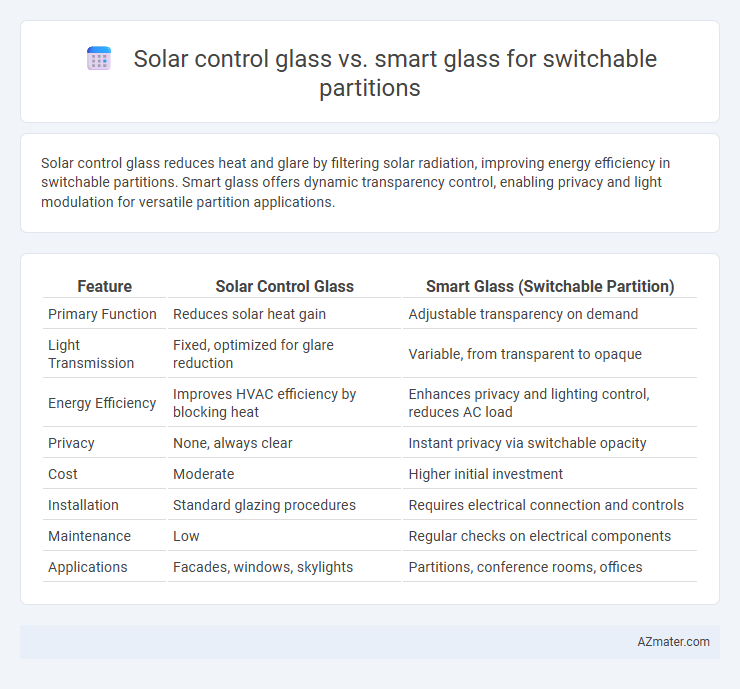Solar control glass reduces heat and glare by filtering solar radiation, improving energy efficiency in switchable partitions. Smart glass offers dynamic transparency control, enabling privacy and light modulation for versatile partition applications.
Table of Comparison
| Feature | Solar Control Glass | Smart Glass (Switchable Partition) |
|---|---|---|
| Primary Function | Reduces solar heat gain | Adjustable transparency on demand |
| Light Transmission | Fixed, optimized for glare reduction | Variable, from transparent to opaque |
| Energy Efficiency | Improves HVAC efficiency by blocking heat | Enhances privacy and lighting control, reduces AC load |
| Privacy | None, always clear | Instant privacy via switchable opacity |
| Cost | Moderate | Higher initial investment |
| Installation | Standard glazing procedures | Requires electrical connection and controls |
| Maintenance | Low | Regular checks on electrical components |
| Applications | Facades, windows, skylights | Partitions, conference rooms, offices |
Introduction to Switchable Partition Solutions
Switchable partition solutions leverage innovative glass technologies to enhance privacy and control light transmission within interior spaces. Solar control glass minimizes heat gain and glare by reflecting and absorbing solar radiation, maintaining a comfortable environment while reducing energy costs. Smart glass, equipped with electrochromic or PDLC technology, allows instant modulation of transparency, offering versatile privacy and dynamic light management for modern architectural applications.
What is Solar Control Glass?
Solar control glass is engineered with coatings that reflect and absorb solar radiation to reduce heat gain and glare while allowing natural light to pass through. It enhances energy efficiency by minimizing the need for air conditioning and protects interior furnishings from UV damage. Smart glass, by contrast, offers dynamic control over transparency but typically features less emphasis on solar heat reduction compared to specialized solar control glass.
Understanding Smart Glass Technology
Smart glass technology utilizes electrochromic, photochromic, or thermochromic materials to dynamically adjust transparency and light transmission in switchable partitions, offering automated control over privacy and solar heat gain. Unlike solar control glass, which passively reduces UV and infrared radiation through fixed coatings, smart glass responds to electrical stimuli to modulate shading and glare in real time. This adaptive functionality enhances energy efficiency and occupant comfort by optimizing daylight use and minimizing reliance on artificial lighting and air conditioning.
Light and Heat Control: Comparing Both Options
Solar control glass effectively reduces solar heat gain and glare by using specialized coatings that reflect infrared and UV rays while maintaining natural light transmission. Smart glass offers dynamic light and heat control through electrochromic or thermochromic technology, enabling adjustable transparency and shading to optimize comfort and energy efficiency. Both options improve indoor climate management, but smart glass provides enhanced adaptability for varying light conditions in switchable partitions.
Privacy Features and Flexibility
Solar control glass offers high privacy by reducing glare and blocking UV rays, making it ideal for consistent privacy in switchable partitions. Smart glass enhances flexibility with its ability to switch instantly between transparent and opaque states, allowing dynamic control over privacy according to situational needs. Combining solar control glass with smart glass technology optimizes energy efficiency while providing adaptable privacy solutions in modern architectural designs.
Energy Efficiency and Cost Savings
Solar control glass significantly reduces solar heat gain, lowering cooling costs and enhancing energy efficiency in switchable partitions by blocking up to 80% of infrared radiation. Smart glass offers dynamic control over light and heat transmission, enabling real-time adjustments that optimize energy usage and provide up to 30% savings on cooling and lighting expenses. While solar control glass provides a cost-effective, passive solution with minimal maintenance, smart glass involves higher upfront investment but delivers greater long-term energy savings through its adaptive functionality.
Installation and Maintenance Differences
Solar control glass requires standard installation similar to regular glass partitions, benefiting from straightforward fitting without specialized electrical components. Maintenance involves routine cleaning and occasional inspection for coating integrity to ensure optimal solar performance. Smart glass installation demands electrical wiring and control systems integration, increasing complexity and initial setup time, while maintenance includes monitoring electronic components and potential software updates to preserve switchable functionality.
Design Aesthetics and Customization
Solar control glass offers superior UV protection and energy efficiency, enhancing design aesthetics with tinted or reflective finishes that reduce glare and heat transmission. Smart glass provides dynamic customization by switching between transparent and opaque states, enabling flexible privacy and light control while maintaining sleek, modern partition designs. Both materials support tailored architectural solutions, but smart glass leads in adaptive functionality and interactive spatial experiences.
Suitability for Residential vs Commercial Spaces
Solar control glass offers excellent heat reduction and UV protection, making it highly suitable for commercial spaces where energy efficiency and glare control are priorities. Smart glass, with its ability to switch from transparent to opaque instantly, provides enhanced privacy and aesthetic flexibility, ideal for residential settings seeking customizable light and privacy options. Commercial environments benefit from solar control glass's durability and cost-effectiveness, while residential applications leverage smart glass's adaptability and modern design features.
Which is Better for Switchable Partitions?
Solar control glass effectively reduces heat gain and glare by reflecting infrared and ultraviolet rays, enhancing energy efficiency in switchable partitions. Smart glass offers dynamic opacity control, allowing users to switch between transparent and opaque states for privacy, but typically provides less thermal insulation compared to solar control glass. For switchable partitions, smart glass is better suited when privacy and adaptable light filtration are priorities, while solar control glass excels in maintaining consistent thermal comfort and energy savings.

Infographic: Solar control glass vs Smart glass for Switchable partition
 azmater.com
azmater.com